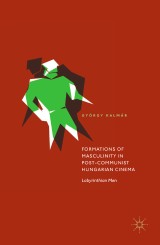Details

Formations of Masculinity in Post-Communist Hungarian Cinema
Labyrinthian Men|
64,19 € |
|
| Verlag: | Palgrave Macmillan |
| Format: | |
| Veröffentl.: | 18.09.2017 |
| ISBN/EAN: | 9783319636641 |
| Sprache: | englisch |
Dieses eBook enthält ein Wasserzeichen.
Beschreibungen
<p>This book investigates the formations of masculinity in Hungarian cinema after the fall of communism and explores some of the cultural phenomena of the years following the 1989 regime change. The films explored offer a unique perspective encompassing two entirely different worlds: state socialism and neoliberal capitalism. The films suggest that Eastern Europe is somehow different than its western counterpart and that its subjects are marked by what they went through before and after 1989. These films are all remembering, interpreting, picturing, marketing and trying to come to terms with this difference—with the memory and effects of state-socialism. In looking closely at the films’ male figures, one may not only get a glimpse of the dramatic changes Eastern European societies went through after the fall of communism but also see the brave new world of global neoliberal capitalism through the eyes of the Eastern European newcomers.</p>
<p>1. Introduction.- 2. The labyrinth principle:<i> </i>Figures of entrapment in Hungarian art-house cinema.- 3. Historical ruptures and ironic masculinities. (<i>Moscow Square</i>. Ferenc Török, 2001).- 4. Men on the margins of history. (<i>Hukkle.</i> György Pálfi, 2002).- 5. Just the Wind. Benedek Fliegauf,<i> </i>2012).- 9. Conclusions.</p>
<p><b>György Kalmár</b> is Reader in film and cultural studies at the Department of British Studies of the University of Debrecen, Hungary. His main teaching and research areas include literary and cultural theory, contemporary Hungarian film, gender studies, and British literature. He has published extensively in the above mentioned fields.</p>
The first book-length study on post-communist Hungarian cinema and masculinities Offers an in-depth analysis of male figures in Hungarian cinema and the identity-politics of post-communism Explores post-communist cinema and its masculinities in a wide social, cultural and historical perspective Includes supplementary material: sn.pub/extras
<p>The first book-length study on post-communist Hungarian cinema and masculinities</p> <p>Offers an in-depth analysis of male figures in Hungarian cinema and the identity-politics of post-communism</p> <p>Explores post-communist cinema and its masculinities in a wide social, cultural and historical perspective</p>
“By examining a number of key films produced in Hungary by directors such as György Pálfi, Kornél Mundruczó and Szabolcs Hajdú in the period following the fall of state socialism, Gyorgy Kalmar attempts to discover what happened to Hungarian men in this period. He argues that their protagonists are trapped in a ‘labyrinthine’ history of their country. Rather than taking this state of affairs for granted, Kalmar attempts to open up this labyrinth, drawing on the history of Hungary and its cinema, as well as his own experience as someone who grew up in the last period of state socialism and bore witness to Eastern Europe’s painful transition to the market economy.” (Ewa Mazierska, Professor of Contemporary Cinema at the School of Humanities and Social Sciences, University of Central Lancashire, UK)<p></p>

















